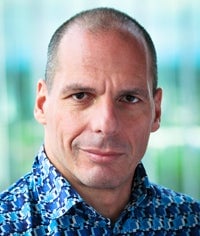Greece’s new finance minister learned about tearing down capitalism from working at a video game company
Yanis Varoufakis is widely expected to become Greece’s new finance minister after Syriza, an upstart left-wing party made up of marxists, greens, communists, and everything in between, won elections there. As you might expect, he’s no ordinary financier—his preparations for leading Greece out of austerity included a year as the chief economist for a bustling virtual economy.


Yanis Varoufakis is widely expected to become Greece’s new finance minister after Syriza, an upstart left-wing party made up of marxists, greens, communists, and everything in between, won elections there. As you might expect, he’s no ordinary financier—his preparations for leading Greece out of austerity included a year as the chief economist for a bustling virtual economy.
Varoufakis’ last policy job was advising center-left stalwart George Papandreou, who would later become prime minister during the debt crisis that plunged his country into a depression. Emerging as a critic of Papandreou and the broader European establishment in 2010, Varoufakis weighed in on the challenge of uniting two vastly different economies—Germany and Greece—together in one monetary system. (This and his many other thoughts are explained in detail on his rather lively blog.)

While European institutions weren’t interested in his arguments for a reduction in Greece’s debt load and a more unified EU at the time, someone else was listening—Gabe Newell, the co-founder of multi-billion dollar video game maker Valve. Many of Valve’s games have internal economies for buying and selling in-game items, and these economies had become linked through Steam, an application gamers used to barter virtual goods and buy products from Valve. “Here at my company we were discussing an issue of linking economies in two virtual environments,” Newell wrote, “when it occurred to me, ‘This is Germany and Greece.'”
“If you think of these as the social community of one game as one economy, Steam is a little bit like an international system that binds together different economies, just like the foreign exchange market does,” Varoufakis told me in 2012 for an article in Tomorrow magazine.
The real world
Varoufakis was attracted by the opportunity to run economic experiments in an ecosystem populated by humans, with all the weird things they do that simulated rational actors in a model don’t. While messing around with schemes to maintain stable rates of in-game inflation, he mused on how economic exchanges are imbued with social norms that many economists ignore. This seems like a formative moment when it comes to dealing with European institutions, many of which exist more by dint of political will rather than pure economic sense.
This doesn’t man that Varoufakis disbelieves the power of free markets—he just thinks they can measure the wrong thing. Valve has a unique management structure where employees choose their own teams and projects, signaling with their time instead of market prices. This holacracy-style management structure proved a boon for Valve, and inspired Varoufakis:
The current system of corporate governance is bunk. Capitalist corporations are on the way to certain extinction. Replete with hierarchies that are exceedingly wasteful of human talent and energies, intertwined with toxic finance, co-dependent with political structures that are losing democratic legitimacy fast, a form of post-capitalist, decentralised corporation will, sooner or later, emerge.
While he’s not likely to implement this strategy at the finance ministry—and concedes that it’s probably not the right organization for an industrial firm—his writing on the economics of work gives you a sense of the kind of human-focused economics he’d like to bring to Greece.
“One of the great disappointments in my working life was the way in which economics has failed to learn from its own mistakes” after the 2008 crisis, Varoufakis said in 2012. “Potentially, we can be more honest as economists when we are studying virtual economies than we are when we study real economies.”
Making the case
When it comes to specifics, Varoufakis will be charged with convincing an extremely skeptical Germany that restructuring Greece’s debt is the only way to turn around the country. In a recent interview, he notes that the new government will have to work with German chancellor Angela Merkel to sell such a plan to the euro zone’s biggest paymaster, but says that the repeated failure to make Greece’s debt sustainable will be the new government’s strongest argument.
He has long pushed for an EU banking union, mutualization of debt across the bloc, and a bigger role for the European Investment Bank in financing infrastructure as part of a joined-up, continent-wide investment strategy. If only policymakers would remove these cross-border barriers, “Greece would be out of the woods.”
“The fact that Greece is making the headlines now for two and half years, it just goes to show you something is not right,” Varoufakis told me in 2012. “Greece is not important enough. It’s like Delaware bringing the United States down.”